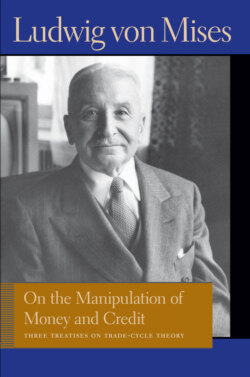Читать книгу On the Manipulation of Money and Credit - Людвиг фон Мизес - Страница 11
На сайте Литреса книга снята с продажи.
2. Undesired Consequences
ОглавлениеIf the future prospects for a money are considered poor, its value in speculations, which anticipate its future purchasing power, will be lower than the actual demand and supply situation at the moment would indicate. Prices will be asked and paid which more nearly correspond to anticipated future conditions than to the present demand for, and quantity of, money in circulation.
The frenzied purchases of customers who push and shove in the shops to get something, anything, race on ahead of this development; and so does the course of the panic on the Bourse where stock prices, which do not represent claims in fixed sums of money, and foreign exchange quotations are forced fitfully upward. The monetary units available at the moment are not sufficient to pay the prices which correspond to the anticipated future demand for, and quantity of, monetary units. So trade suffers from a shortage of notes. There are not enough monetary units [or notes] on hand to complete the business transactions agreed upon. The processes of the market, which bring total demand and supply into balance by shifting exchange ratios [prices], no longer function so as to bring about the exchange ratios which actually exist at the time between the available monetary units and other economic goods. This phenomenon could be clearly seen in Austria in the late fall of 1921.3 The settling of business transactions suffered seriously from the shortage of notes.
Once conditions reach this stage, there is no possible way to avoid the undesired consequences. If the issue of notes is further increased, as many recommend, then things would only be made still worse. Since the panic would keep on developing, the disproportionality between the depreciation of the monetary unit and the quantity in circulation would become still more exaggerated. The shortage of notes for the completion of transactions is a phenomenon of advanced inflation. It is the other side of the frenzied purchases and prices; it is the other side of the “crack-up boom.”
